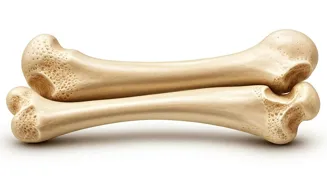Daily Dose of Calcium
Calcium is a vital mineral, crucial for building and maintaining strong bones. It is the fundamental building block that provides the framework and structure
for skeletal health. Consuming calcium-rich foods, such as dairy products like milk, yogurt, and cheese, is an excellent strategy. If you don't consume dairy, explore alternative sources like fortified plant-based milk (almond, soy), leafy green vegetables (kale, spinach), and calcium-set tofu. The National Institutes of Health (NIH) recommends that adults between the ages of 19 and 50 should aim for 1,000 milligrams of calcium daily to meet the body’s demands and reduce the risk of osteoporosis. As one gets older, these demands increase; for those over 50, the requirement rises to 1,200 milligrams per day. The absorption of calcium is also enhanced when paired with Vitamin D, and it contributes to bone density and strength, ensuring bones stay robust and resilient against fractures and injuries. A diet deficient in calcium may lead to diminished bone density and could be a factor in the development of conditions like osteoporosis over time.
Vitamin D is Essential
Vitamin D plays a crucial role in calcium absorption. Without enough Vitamin D, the body struggles to effectively use the calcium consumed, diminishing its positive effects on bone health. Vitamin D is produced naturally by the body when the skin is exposed to sunlight. Aim for around 15 minutes of sunlight exposure a day, particularly during the early morning or late afternoon. Moreover, vitamin D is found in fatty fish, such as salmon and mackerel, and fortified foods, including milk, cereals, and orange juice. Supplementation might be necessary, especially if you live in an area with limited sunlight or if you're older. Speak with a healthcare provider to determine the best vitamin D intake for your specific needs. Adequate vitamin D levels will help your body absorb calcium, thereby helping maintain bone density, reducing the risk of osteoporosis and fracture, and improving overall bone health.
Regular Weight-Bearing Exercise
Engaging in regular weight-bearing exercise is a powerful habit to fortify bone strength. Weight-bearing exercises force you to work against gravity, which stimulates bone formation. Examples include walking, jogging, dancing, and climbing stairs. These activities apply stress to the bones, signaling them to build more density and become stronger. Aim for at least 30 minutes of moderate-intensity weight-bearing exercise most days of the week. Also, consider incorporating resistance training with weights or resistance bands, as this type of exercise also contributes to bone strength by strengthening muscles. Regular physical activity keeps your bones strong by increasing bone density, which reduces the risk of age-related bone loss and fractures. Start slowly and progressively increase the intensity and duration of the workouts.
Balanced Diet Matters
A well-balanced diet is a cornerstone of bone health. It supports the body's need for essential nutrients, which not only builds the strength of your bones but also keeps your body healthy overall. Beyond calcium and vitamin D, other nutrients are essential for bone health. Make sure you include plenty of protein, as it is crucial for bone health, giving it structure. Ensure you consume enough magnesium, vitamin K, and phosphorus, which help in bone formation and maintenance. A diet rich in fruits, vegetables, whole grains, and lean protein not only aids in bone health but also provides energy and helps prevent other chronic diseases. Limit the consumption of processed foods, sugary drinks, and excessive amounts of salt, which can have adverse effects on bone health. Maintain a diet rich in nutrients that keep your bones strong and your body functioning well.
Avoid Smoking and Limit Alcohol
Smoking and excessive alcohol consumption can negatively impact bone health. Smoking inhibits the production of bone-building cells, which weakens bones and increases the risk of fractures. If you smoke, consider quitting for the benefit of your bone health, and overall well-being. Excessive alcohol consumption is equally detrimental as it can hinder calcium absorption and disrupt hormone balance, which can further reduce bone density. Women should limit alcohol intake to one drink per day, while men should restrict themselves to two drinks per day. By reducing these habits, the body can function effectively. Furthermore, it is important to monitor the amount of alcohol one consumes. Regular physical exercise paired with a healthy, balanced diet can positively impact bone health.
Bone Density Screenings
Bone density screenings are essential in monitoring bone health and the need for proactive healthcare approaches. Regular bone density tests help assess your bone mineral density (BMD) and identify signs of bone loss or osteoporosis early. These tests use a technology called dual-energy X-ray absorptiometry (DEXA) to measure bone density, typically in the hip and spine. The information gained helps identify risk factors and provides a basis for intervention. Speak to your healthcare provider about when to begin bone density screenings. If you have a family history of osteoporosis, are of a certain age, or have other risk factors, you might need to begin screenings earlier. Understanding your bone health through regular screenings allows you to make informed decisions about lifestyle changes, supplements, and medical treatments to ensure long-term bone health and prevent fractures, thus improving your quality of life.


















